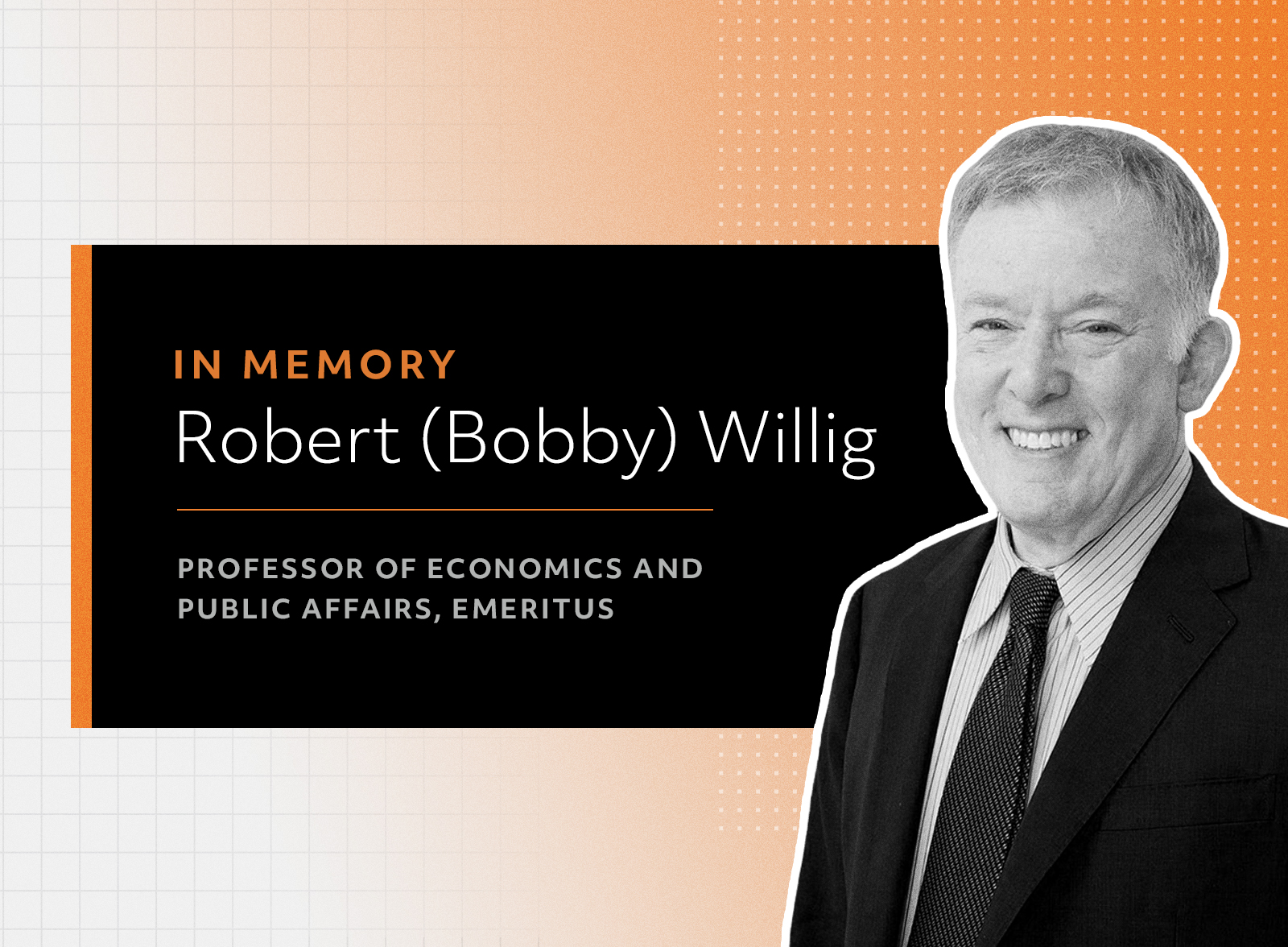In Memory of Longtime Princeton Professor Robert (Bobby) Willig

Faculty and staff are saddened to learn of the passing of Robert “Bobby” Willig, longtime Princeton professor and leader in the field of Industrial Organization. Willig was a Professor of Economics and Public Affairs, Emeritus with the Economics Department and Princeton’s School of Public and International Affairs.
Willig served on Princeton’s faculty for 43 years, including as the Faculty Chair of the Master’s Program in Public Affairs. In a review of his many professional contributions, published as Willig transitioned to Emeritus status, Princeton estimated that 1,200 of the world’s leading policymakers owe their microeconomic training to Professor Willig.
“Bobby was a wonderful colleague and a brilliant economist,” said Economics Department Chair Wolfgang Pesendorfer. “During his impressive career, Bobby made seminal academic contributions, in particular to the analysis of competition and market structures. At the same time, he was deeply involved in antitrust and regulatory policy. His combination of academic brilliance and practical experience made him a wonderful teacher who inspired many of our students.”
Gene Grossman, the Jacob Viner Professor of International Economics, spoke to Willig’s influence as researcher, practitioner, and teacher.
“Throughout his long career, Bobby moved seamlessly between the worlds of economic theory and economic practice,” Grossman said. “His insights informed and transformed U.S. antitrust policy in a myriad of industries. Above all, Bobby loved to teach about economics—be it to Princeton undergraduates, to policy students in the School of Public and International Affairs, to the policy makers who wrote the competition rules, or to the judges and juries who were left to interpret them.”
Department of Justice Public Service
In addition to publishing foundational research in the field of Industrial Organization and training generations of students, Willig was a devoted public servant. From 1989-1992, he served as the Deputy Assistant Attorney General for Economics in the Antitrust Division of the United States Department of Justice (DOJ). Throughout his storied career, he also worked with the Federal Trade Commission, the Organization for Economic Cooperation and Development, the Inter-American Development Bank, the World Bank, and many national governments.
At DOJ, Willig applied his expertise to lead the 1992 update of the DOJ/Federal Trade Commission (FTC) Horizontal Merger Guidelines that outline how the federal government should evaluate the likely competitive impact of a merger.
Speaking at a memorial for Willig, the economist Jonathan Marc Orszag (’96), co-founder of the economic consulting firm Compass Lexecon, said, “There is not an economic issue over the past five decades that Bobby didn’t help shape, but perhaps his most significant contributions to the antitrust world were to the 1992 Horizontal Merger Guidelines. It was Bobby’s influence that put economic influence at the center of merger matters, and the economy is so much better off as a result.”
Research and Academic Contributions
Willig is the author of “Welfare Analysis of Policies Affecting Prices and Products” (1980) and “Contestable Markets and the Theory of Industry Structure” (with W. Baumol and J. Panzar, 1982) as well as numerous academic papers and book chapters. Much of his research argues that consumer surplus can be used as a measure of (unobserved) social welfare. This established the “consumer surplus standard” for antitrust in articles dating back to the 1970s.
In “Contestable Markets,” Willig and his co-authors analyzed factors that determine price and structure in a market and made important contributions to the application of antitrust law. They argued that the mere presence of firms that might enter a market, even briefly, can make even a small market with few active firms behave as if its competitive. They also argued that not all concentrated markets are comprised of firms that exploit their market power to control prices. Even with concentrated market power, firms may be constrained by that fact that other firms could enter the market.
Willig was a co-editor of “The Handbook of Industrial Organization,” and “Can Privatization Deliver?: Infrastructure for Latin America,” and “Second Generation Reforms in Infrastructure Services.” Willig was a Fellow of the Econometric Society and served on the editorial boards of the American Economic Review, the Journal of Industrial Economics, and the MIT Press Series on Regulation.
A Strong Family Legacy
Willig was born in Brooklyn, New York, and earned an undergraduate degree from Harvard in mathematics. He received his Ph.D. in economics from Stanford University and, after leading the Economics Research group at Bell Labs, was recruited to Princeton’s faculty in 1978.
Willig is predeceased by his parents Meg and Jack Willig, and his sister Paula Siegel. He is survived by his wife of 49 years Ginny Mason; his four children Jared Mason Willig (Chief Content Officer, Townsquare Media and former Managing Director, AOL Entertainment) and wife Julia Benedict, Scott Mason Willig (Head of Precious Metal Trading and Managing Director, JP Morgan) and wife Brittany Harris, Brent Mason Willig (Team Lead at The Emerson Group) and wife Sasha Khachatryan, and Alexandra Mason Willig (Vice President at Horizon Media) and husband David Helene; eight grandchildren Samantha, Allison, Jax, Charlotte, Elle, Naomi, Banks, and Jordan Willig; beloved nephews Danny Siegel and David Siegel and wife Myra Clark-Siegel and children Noa, Elai and Benjamin. An obituary produced by the Mason-Willig family can be found here.